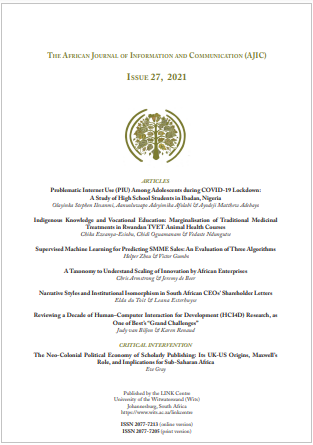The Neo-Colonial Political Economy of Scholarly Publishing: Its UK-US Origins, Maxwell's Role, and Implications for Sub-Saharan Africa
Keywords:
Scholarly publishing, Academic journals, Global science, Universities, Colonialism, Decolonisation, Impact metrics, Distribution rights, Copyright, Fair use, Fair dealing, Robert Maxwell, United Kingdom, United States, Sub-Saharan Africa, South AfricaAbstract
The prevailing dynamics of today's global scholarly publishing ecosystem were largely established by UK and US publishing interests in the years immediately after the Second World War. With a central role played by publisher Robert Maxwell, the two nations that emerged victorious from the war were able to dilute the power of German-language academic publishing-dominant before the war-and bring English-language scholarship, and in particular English-language journals, to the fore. Driven by intertwined nationalist, commercial, and technological ambitions, English-language academic journals and impact metrics gained preeminence through narratives grounded in ideas of "global" reach and values of "excellence"-while "local" scholarly publishing in sub-Saharan Africa, as in much of the developing world, was marginalised. These dynamics established in the post-war era still largely hold true today, and need to be dismantled in the interests of more equitable global scholarship and socio-economic development.
References
Baude, W., Hofman, J., Katz, E., McDaniel, K., Res, A., & Riley, C. (2006). Model language for exceptions and limitations to copyright concerning access to learning materials in South Africa. The Southern African Journal of Information and Communication (SAJIC), 7, 82-106. https://doi.org/10.23962/10539/19800
Cox, B. (1998). The Pergamon phenomenon, 1951-1991: A memoir of the Maxwell years. Logos: The Journal of the World Book Community, 9(3), 135-140.
Gray, E., & Czerniewicz, L. (2018). Access to learning resources in post-apartheid South Africa. In J. Karaganis (Ed.), Shadow Libraries - Access to knowledge in global higher education. MIT Press. https://direct.mit.edu/books/book/3600/chapter/120594/Access-to-Learning-Resources-in-Post-apartheid
Henderson, A. (2004). The dash and determination of Robert Maxwell: Champion of dissemination. Logos: The Journal of the World Book Community, 15(2), 63-74.
infojustice (2019, August 16). Decolonising copyright: Building our creative and information economy. http://infojustice.org/archives/41492
Kleyn, L., & Nicholson, D. (2018, October 26). The cost of accessing academic research is way too high. This must change. world.edu. https://www.world.edu/the-cost-of-accessing-academic-research-is-way-too-high-this-must-change
Nicholson, D. (2020, July 18). COVID and copyright - impact on education and libraries in South Africa. infojustice. http://infojustice.org/archives/42517
Republic of South Africa (RSA). (2017). Copyright Amendment Bill. https://libguides.wits.ac.za/ld.php?contentid=45613747
S v Makwanyane and Another (CCT3/94) [1995] ZACC 3; 1995 (6) BCLR 665; 1995 (3) SA 391; [1996] 2 CHRLD 164; 1995 (2) SACR 1 (6 June 1995)
Downloads
Published
Issue
Section
License
Copyright (c) 2021 Eve Gray

This work is licensed under a Creative Commons Attribution 4.0 International License.
How to Cite
- Abstract 491
- PDF 193


.png)